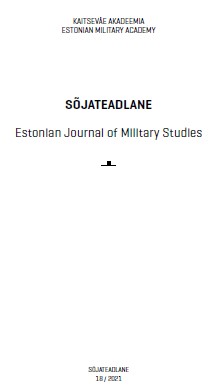KUIDAS TÕRJUB VENEMAA SÜÜDISTUSI KÜBER- JA VALEINFORÜNNAKUTES: UUDISEPORTAALI RT KEELELISTE STRATEEGIATE ANALÜÜS
HOW RUSSIA DEFLECTS BLAME FOR ITS CYBER AND INFORMATION ATTACKS: AN ANALYSIS OF THE DISCURSIVE STRATEGIES OF RT.COM
Author(s): Julius Koppel, Sten HanssonSubject(s): Media studies, Government/Political systems, International relations/trade, Politics and communication, ICT Information and Communications Technologies
Published by: Kaitseväe Akadeemia (KVA)
Keywords: Russia; strategic communication; cyberattack; information warfare; blame avoidance; RT;
Summary/Abstract: The Russian Federation uses cyber and information attacks against other countries to achieve its own geopolitical goals. Although the international community has criticised these practices, the Russian government is still trying to deflect blame and justify its actions. To better understand Russia’s strategic communication, we analysed the ways in which accusations against Russia for its cyber and information attacks are depicted in Russia’s primary government-funded international news portal RT.com. Our analysis revealed that blame for Russia’s cyber and information attacks is deflected in the articles published by RT in four main ways: (1) accusations are depicted as groundless and lacking evidence, (2) the accusers are cast as malicious and Russia as the victim, (3) the accusers are portrayed as unreliable or ridiculous, and (4) the attention of readers is distracted away from the accusations.
Journal: Sõjateadlane
- Issue Year: 2021
- Issue No: 18
- Page Range: 160-183
- Page Count: 24
- Language: Estonian

